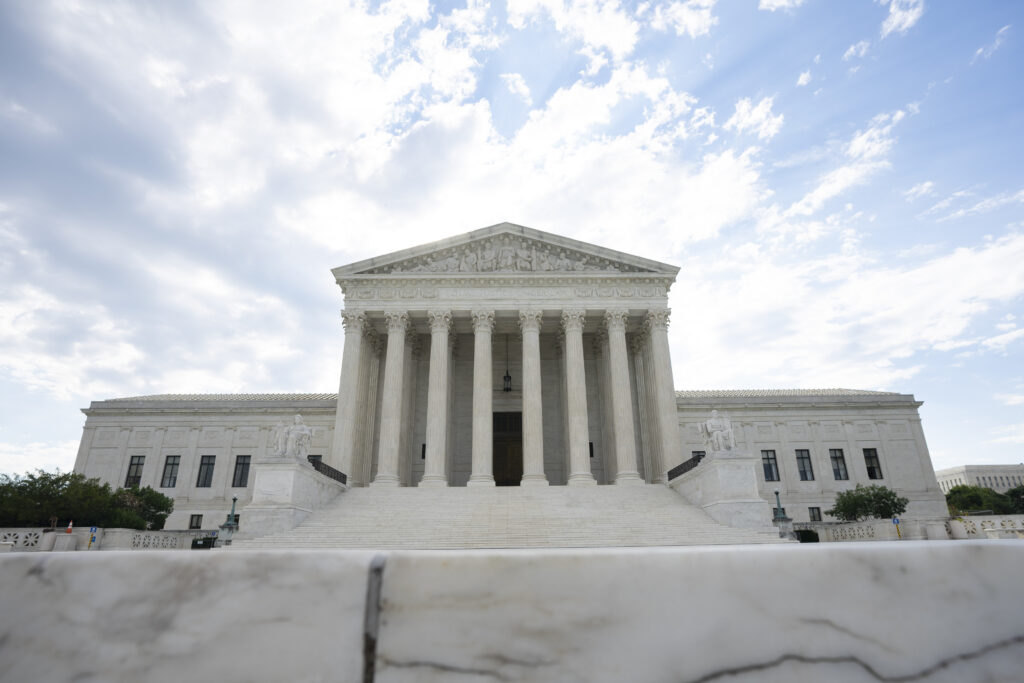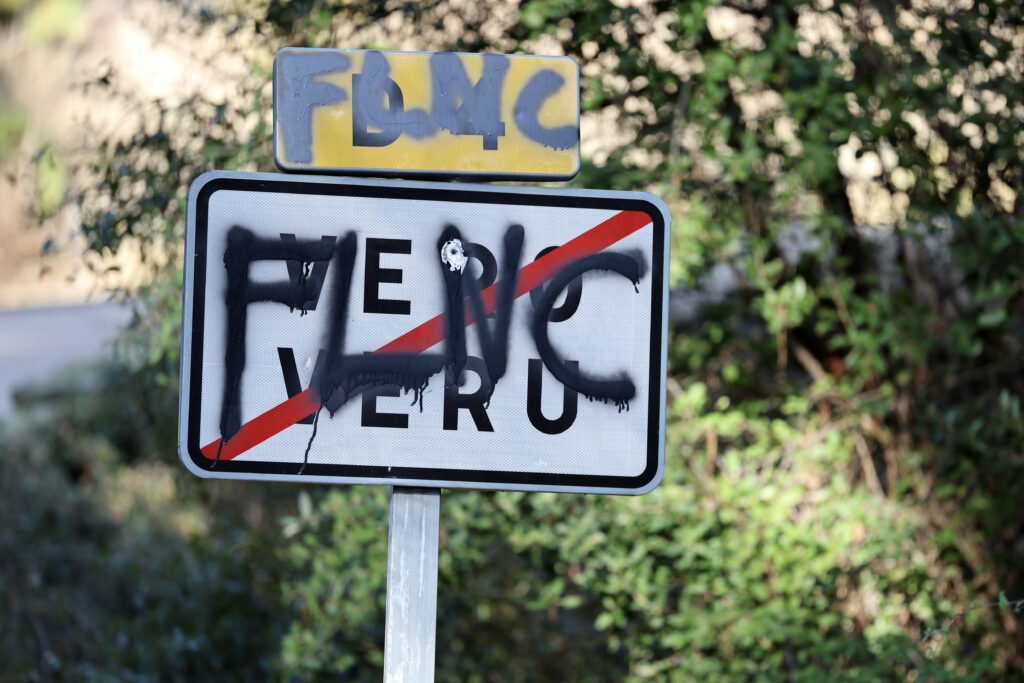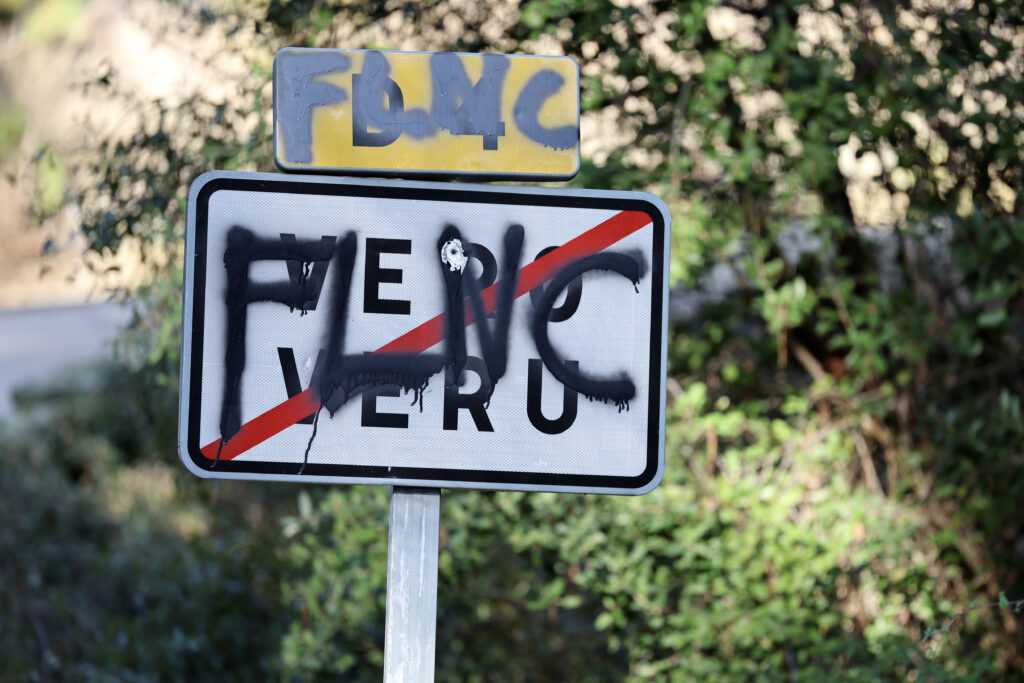US Supreme Court weighs transgender athlete bans
The US Supreme Court waded on Tuesday into the hot-button issue of transgender athletes in girls’ and women’s sports.The conservative-dominated court is hearing challenges to state laws in Idaho and West Virginia banning transgender athletes from female competition.More than two dozen US states have passed laws in recent years barring athletes who were assigned as male at birth from taking part in girls’ or women’s sports.The Idaho case being heard by the nine justices stems from the Republican-led state’s 2020 Fairness in Women’s Sports Act.It was challenged by a transgender athlete at an Idaho university, and lower courts ruled that it violates the equal protection clause of the US Constitution.”Idaho’s law classifies on the basis of sex, because sex is what matters in sports,” Alan Hurst, the Idaho solicitor general, said during Tuesday’s oral arguments.”It correlates strongly with countless athletic advantages like size, muscle mass, bone mass and heart and lung capacity,” Hurst said. “If women don’t have their own competitions, they won’t be able to compete.”West Virginia’s 2021 Save Women’s Sports Act was challenged by a middle school student who was not allowed to compete for the girls’ track team.An appeals court ruled that the ban amounted to discrimination on the basis of sex and violated Title IX, the federal civil rights law which prohibits sex-based discrimination in educational programs.Last February, President Donald Trump issued an executive order aimed at banning transgender athletes from girls’ and women’s sports after campaigning for the White House on the issue.”From now on women’s sports will be only for women,” Trump said. “With this executive order the war on women’s sports is over.”The executive order allows federal agencies to deny funding to schools that allow transgender athletes to compete on girls’ or women’s teams.- UPenn case a lightning rod -University of Pennsylvania swimmer Lia Thomas became a lightning rod in the debate over transgender athletes in women’s sports after competing in female collegiate meets in 2022. Critics and some fellow swimmers said Thomas, who had earlier swum on UPenn’s men’s team, should not have been allowed to compete against women due to an unfair physiological advantage.UPenn eventually agreed to ban transgender athletes from its women’s sports teams, settling a federal civil rights complaint stemming from the furor around Thomas.The move followed an investigation by the Education Department’s Office for Civil Rights which concluded the university had violated Title IX by allowing Thomas to compete in women’s competitions.Conservatives outnumber liberals six to three on the Supreme Court, and the justices weighed in on two high-profile transgender cases last year.They upheld a Tennessee state law banning gender-affirming medical treatment for transgender minors and backed a move by Trump to have transgender troops dismissed from the military.The Supreme Court is expected to rule on the new case in June or early July.
Choc et enquête en Corse au lendemain de l’assassinat d’Alain Orsoni aux obsèques de sa mère
Au lendemain de l’assassinat retentissant d’Alain Orsoni, figure du nationalisme corse reconverti dans les affaires, aux funérailles de sa mère, camarades nationalistes et élus dénoncent un crime “innommable”, qui mobilise enquêteurs et magistrats anticriminalité les plus rodés du pays.Le président autonomiste du conseil exécutif Gilles Simeoni, homme fort de l’île, a présenté mardi ses condoléances aux proches de cette “figure marquante de l’histoire contemporaine du nationalisme corse, dans sa part de lumière comme dans sa part d’ombre”, estimant, dans un communiqué, que ce nouvel assassinat “participe d’une pression mafieuse qui pèse lourdement sur la société corse”.”Le respect des morts, ainsi bafoué, emporte dans sa chute terrible notre tradition et les valeurs de notre civilisation”, avait réagi lundi le Parti de la nation corse (PNC), autonomistes opposés au parti de Gilles Simeoni.Mais pour bon nombre des historiques du Front de libération nationale corse (FLNC) dont Alain Orsoni était un des fondateurs, “ça fait déjà très longtemps qu’il n’était plus un nationaliste mais plutôt un membre de la voyoucratie”, analyse pour l’AFP Thierry Dominici, politologue à l’université de Bordeaux, spécialiste des mouvements nationalistes.Il n’a d’ailleurs “pas d’impact, ni idéologique, ni intellectuel, sur les militants” indépendantistes actuels, estime l’universitaire.- “En plein cœur” -Lundi vers 16H30, Alain Orsoni, 71 ans, a été touché “en plein cœur” d’une unique balle provenant “d’un tir à longue distance” avec une arme “certainement équipée d’une lunette” alors qu’il assistait à l’enterrement de sa mère dans le cimetière en terrasses de Véro, son village familial situé à une trentaine de kilomètres d’Ajaccio, selon le procureur d’Ajaccio et une source proche de l’enquête.”Il vient pour enterrer sa mère de 91 ans et on jette le corps du fils sur le cercueil de sa mère, c’est innommable, c’est ignoble”, s’est indigné Jo Peraldi, proche d’Alain Orsoni et ancien chef du FLNC, interrogé par l’AFP.Mardi, sur le terrain, les enquêteurs étaient à pied d’œuvre pour localiser le lieu où s’était embusqué le tireur et des scellés ont été posés devant un pin, à une centaine de mètres de l’escalier du cimetière où Alain Orsoni s’est effondré, mortellement touché, ont constaté des journalistes de l’AFP. Son autopsie est prévue mercredi après-midi, a précisé à l’AFP une source proche du dossier.Le tout nouveau Parquet national anti-criminalité organisée (Pnaco), dont une magistrate est arrivée sur place mardi, a très rapidement annoncé se saisir de l’enquête, “au regard notamment de la qualité de la victime et de son appartenance au milieu corse”, en co-saisine avec la Juridiction interrégionale spécialisée (Jirs) de Marseille.Le septuagénaire venait d’arriver dimanche du Nicaragua où il vivait et travaillait dans le secteur des jeux.”Il n’avait pas l’air inquiet du tout, il avait fait des courses le matin en ville à Ajaccio sans gilet pare-balles”, a précisé M. Peraldi à l’AFP.- “Nos valeurs s’envolent” -Marie-France Orsoni (homonyme de la victime), maire de Véro, a fait part mardi de sa “sidération” à l’AFP-TV, “parce qu’un crime, un meurtre dans (…) un lieu saint, c’est inédit. Nos valeurs s’envolent”.”Avec le départ d’Alain, c’est une grande part de l’histoire de l’Athletic Club Ajaccio (ACA) qui s’éteint”, a écrit dans un communiqué le club de foot, aujourd’hui exclu des compétitions nationales, en saluant celui qui en fut le président et avait conduit le club en ligue 1 avant la bérézina.Les drames et vengeances, la famille Orsoni en connaît depuis plus de 40 ans. En 1983, Guy, le frère d’Alain, lui-même militant nationaliste, était assassiné. Un an plus tard, nait le fils d’Alain, qu’il appellera Guy en souvenir. Actuellement détenu, il est considéré comme une figure du banditisme insulaire.Alain Orsoni avait fait scission du FLNC et fondé le Mouvement pour l’autodétermination (MPA), le “Mouvement pour les affaires”, selon ses détracteurs.Condamné et écroué dans plusieurs dossiers, il avait quitté la Corse en 1996, en pleine guerre fratricide nationaliste.Il s’agit sans doute d’un des meurtres les plus retentissants depuis celui du bâtonnier Antoine Sollacaro en 2012, qui était son avocat et dont le tueur a été condamné en décembre à 30 ans de prison, en l’absence du commanditaire présumé de ce meurtre, Jacques Santoni, soupçonné d’être le chef de la bande criminelle du Petit Bar.C’est cette même bande criminelle qui avait été impliquée dans le projet d’assassinat visant déjà Alain Orsoni en 2008 et une forte rivalité oppose depuis plusieurs années le clan Orsoni, dont plusieurs membres ont été assassinés, au Petit Bar.
Choc et enquête en Corse au lendemain de l’assassinat d’Alain Orsoni aux obsèques de sa mère
Au lendemain de l’assassinat retentissant d’Alain Orsoni, figure du nationalisme corse reconverti dans les affaires, aux funérailles de sa mère, camarades nationalistes et élus dénoncent un crime “innommable”, qui mobilise enquêteurs et magistrats anticriminalité les plus rodés du pays.Le président autonomiste du conseil exécutif Gilles Simeoni, homme fort de l’île, a présenté mardi ses condoléances aux proches de cette “figure marquante de l’histoire contemporaine du nationalisme corse, dans sa part de lumière comme dans sa part d’ombre”, estimant, dans un communiqué, que ce nouvel assassinat “participe d’une pression mafieuse qui pèse lourdement sur la société corse”.”Le respect des morts, ainsi bafoué, emporte dans sa chute terrible notre tradition et les valeurs de notre civilisation”, avait réagi lundi le Parti de la nation corse (PNC), autonomistes opposés au parti de Gilles Simeoni.Mais pour bon nombre des historiques du Front de libération nationale corse (FLNC) dont Alain Orsoni était un des fondateurs, “ça fait déjà très longtemps qu’il n’était plus un nationaliste mais plutôt un membre de la voyoucratie”, analyse pour l’AFP Thierry Dominici, politologue à l’université de Bordeaux, spécialiste des mouvements nationalistes.Il n’a d’ailleurs “pas d’impact, ni idéologique, ni intellectuel, sur les militants” indépendantistes actuels, estime l’universitaire.- “En plein cœur” -Lundi vers 16H30, Alain Orsoni, 71 ans, a été touché “en plein cœur” d’une unique balle provenant “d’un tir à longue distance” avec une arme “certainement équipée d’une lunette” alors qu’il assistait à l’enterrement de sa mère dans le cimetière en terrasses de Véro, son village familial situé à une trentaine de kilomètres d’Ajaccio, selon le procureur d’Ajaccio et une source proche de l’enquête.”Il vient pour enterrer sa mère de 91 ans et on jette le corps du fils sur le cercueil de sa mère, c’est innommable, c’est ignoble”, s’est indigné Jo Peraldi, proche d’Alain Orsoni et ancien chef du FLNC, interrogé par l’AFP.Mardi, sur le terrain, les enquêteurs étaient à pied d’œuvre pour localiser le lieu où s’était embusqué le tireur et des scellés ont été posés devant un pin, à une centaine de mètres de l’escalier du cimetière où Alain Orsoni s’est effondré, mortellement touché, ont constaté des journalistes de l’AFP. Son autopsie est prévue mercredi après-midi, a précisé à l’AFP une source proche du dossier.Le tout nouveau Parquet national anti-criminalité organisée (Pnaco), dont une magistrate est arrivée sur place mardi, a très rapidement annoncé se saisir de l’enquête, “au regard notamment de la qualité de la victime et de son appartenance au milieu corse”, en co-saisine avec la Juridiction interrégionale spécialisée (Jirs) de Marseille.Le septuagénaire venait d’arriver dimanche du Nicaragua où il vivait et travaillait dans le secteur des jeux.”Il n’avait pas l’air inquiet du tout, il avait fait des courses le matin en ville à Ajaccio sans gilet pare-balles”, a précisé M. Peraldi à l’AFP.- “Nos valeurs s’envolent” -Marie-France Orsoni (homonyme de la victime), maire de Véro, a fait part mardi de sa “sidération” à l’AFP-TV, “parce qu’un crime, un meurtre dans (…) un lieu saint, c’est inédit. Nos valeurs s’envolent”.”Avec le départ d’Alain, c’est une grande part de l’histoire de l’Athletic Club Ajaccio (ACA) qui s’éteint”, a écrit dans un communiqué le club de foot, aujourd’hui exclu des compétitions nationales, en saluant celui qui en fut le président et avait conduit le club en ligue 1 avant la bérézina.Les drames et vengeances, la famille Orsoni en connaît depuis plus de 40 ans. En 1983, Guy, le frère d’Alain, lui-même militant nationaliste, était assassiné. Un an plus tard, nait le fils d’Alain, qu’il appellera Guy en souvenir. Actuellement détenu, il est considéré comme une figure du banditisme insulaire.Alain Orsoni avait fait scission du FLNC et fondé le Mouvement pour l’autodétermination (MPA), le “Mouvement pour les affaires”, selon ses détracteurs.Condamné et écroué dans plusieurs dossiers, il avait quitté la Corse en 1996, en pleine guerre fratricide nationaliste.Il s’agit sans doute d’un des meurtres les plus retentissants depuis celui du bâtonnier Antoine Sollacaro en 2012, qui était son avocat et dont le tueur a été condamné en décembre à 30 ans de prison, en l’absence du commanditaire présumé de ce meurtre, Jacques Santoni, soupçonné d’être le chef de la bande criminelle du Petit Bar.C’est cette même bande criminelle qui avait été impliquée dans le projet d’assassinat visant déjà Alain Orsoni en 2008 et une forte rivalité oppose depuis plusieurs années le clan Orsoni, dont plusieurs membres ont été assassinés, au Petit Bar.
Coupe de France: l’OM contre Bayeux pour laisser le PSG derrière
Assommé par le scénario du match perdu face au Paris SG au Trophée des champions, l’OM préfère garder le positif de cette rencontre et se tourne vers un autre de ses objectifs, la Coupe de France, et un affrontement contre les amateurs de Bayeux (R1) ce mardi soir en Normandie.”Le scénario fait mal, avec ce but pris à la fin… J’aurais préféré aller aux tirs au but en étant resté à 1-1 plutôt que d’avoir mené”, a reconnu lundi l’attaquant marseillais Amine Gouiri.Jeudi dernier au Koweït, l’OM est passé très près d’un trophée espéré depuis bientôt 14 ans. Mais le voyage retour s’est fait sans titre, avec des regrets et tout de même le sentiment d’avoir rivalisé avec le PSG, voire un peu plus.”Ce soir, dans le jeu, sur la prestation, on a vu une très belle équipe, qui a toujours essayé de trouver la solution. Je sors de ce match dégoûté, dépité, mais avec beaucoup d’ambitions pour la suite”, avait résumé après le match le directeur du football marseillais Medhi Benatia.”On a encore d’autres occasions de ramener un trophée à Marseille cette saison, ce n’est pas terminé. On va apprendre de ce genre de moments”, avait de son côté noté Benjamin Pavard.La suite, c’est donc la Coupe de France, et un déplacement à Caen pour y affronter Bayeux, équipe de R1, le sixième échelon du football français.Après un passage par Bourg-en-Bresse (National) pour son entrée en lice en 32e de finale, l’OM est pour l’instant préservé par le tirage au sort et peut effectivement croire en ses chances, lui dont la longue et riche histoire d’amour avec la Coupe s’est interrompue en 1989.- Détermination, humilité, attention -“Ça fait plaisir, c’est ça la magie de la Coupe, on peut jouer contre des équipes de toutes les divisions. Mais on doit rester concentré et ne pas les prendre de haut. On doit jouer avec la même humilité que ça soit contre Paris ou contre une R1 comme Bayeux”, a assuré lundi Amine Gouiri.”C’est la Coupe, c’est un objectif, un trophée à aller chercher”, a ajouté l’attaquant algérien, qui a montré jeudi face au PSG que son retour allait faire beaucoup de bien à l’OM de Roberto De Zerbi.”C’est un autre rendez-vous important, on a pris goût à jouer les finales”, a souri le technicien italien lundi. Toujours agacé par la piteuse défaite des siens contre Nantes il y a une semaine en championnat, De Zerbi a lui aussi insisté sur la nécessité de jouer chaque match avec la même intensité. “On doit avoir compris une chose, qu’on aurait dû comprendre plus tôt, c’est que tous les matches doivent être joués de la même façon”, a-t-il dit.”Il n’y a pas de +sur le papier+. On doit entrer sur le terrain et jouer avec la même détermination, la même humilité et la même attention que contre le Real, contre Newcastle, contre le PSG comme on l’a fait deux fois. Sinon on est une équipe à moitié”, a-t-il ajouté.”Demain (mardi soir), je mets la meilleure équipe pour ce match”, a-t-il prévenu.
India hunts rampaging elephant that killed 20 people
Indian wildlife officers are hunting a rampaging wild elephant blamed for killing at least 20 people and injuring 15 others in the forests of Jharkhand, villagers and officials said Tuesday.The elephant, a lone bull, is reported to have gone on the rampage for nine days beginning in early January, creating panic in the rural West Singhbhum district.”We are trying to trace and rescue this violent wild elephant that killed so many people,” government forest officer Aditya Narayan told AFP, confirming the toll of 20 dead.Children and the elderly are among the dead, as well as a professional elephant handler, known as a mahout.But after wreaking a trail of destruction, it had not been spotted since Friday, despite multiple patrols in the area.Officials said search teams, aided by drones, are combing dense forest tracts, including a national reserve in neighbouring Odisha state.Fear has driven residents of more than 20 villages to abandon their farms or barricade themselves indoors at night, elected village head Pratap Chachar told AFP.”A police team, or forest official vehicle, visits in the night to provide essential help to villagers,” Chachar said.Hundreds of thousands of Indians are affected each year by crop-raiding elephants.Asian elephants are now restricted to just 15 percent of their original habitat.The usually shy animals are coming into increasing contact with humans because of rapidly expanding settlements and growing forest disturbance, including mining operations.As elephant habitats shrink, conflict between humans and wild elephants has grown — 629 people were killed by elephants across India in 2023-2024, according to parliamentary figures.The elephants that pose the most danger to humans are often rogue bulls, solitary male animals enraged during “musth”, a period of heightened sexual activity when testosterone levels soar.A former forest official said the elephant was likely in musth, and may now have calmed down and rejoined its herd.India is home to the majority of the world’s remaining wild Asian elephants, a species listed as endangered by the International Union for Conservation of Nature (IUCN) and increasingly threatened by shrinking habitat.The Wildlife Institute of India last year issued a new estimate, that put the country’s wild elephant population at 22,446, a report that also warned of the deepening pressures on one of India’s most iconic animals.
CAN-2025: le titre, seule option pour Walid Regragui
Walid Regragui, sélectionneur du Maroc, symbolise le paradoxe des Lions de l’Atlas, aussi critiqués qu’adulés et dans l’obligation surtout de décrocher un titre qui fuit le royaume depuis 50 ans, avant la demi-finale de “leur” CAN-2025, mercredi, face au Nigeria à Rabat (21h00).Les conférences de presse du technicien de 50 ans sont un spectacle que personne ne veut manquer. Mardi à la veille de ce qui est peut-être “le match le plus important de l’histoire du Maroc”, comme il l’a qualifié lui-même, au moins 200 journalistes se sont serrés dans l’immense salle qui les accueille à côté du stade Moulay Abdellah de la capitale.Regragui, né à Corbeil-Essonnes en France, y répond sans détours aux questions parfois incisives des journalistes locaux, jamais tendres à son égard. Il y parle tactique, fait passer ses messages personnels – comme cet hommage appuyé à Rolland Courbis, son entraîneur lorsqu’il évoluait à Ajaccio et décédé lundi -, et s’y fait l’ardent défenseur du football africain. Il manie l’humour et la légèreté aussi alors même qu’il vit avec la pression de remporter un trophée qui échappe au Maroc depuis 1976, l’année de son dernier, et unique, sacre continental.”J’ai une bonne nouvelle”, a-t-il par exemple lancé mardi. “Azzedine Ounahi va jouer demain!… Non, je déconne.” Son milieu de terrain blessé en phase de groupes est bel et bien forfait pour le reste de la compétition, mais Regragui n’est pas mécontent d’avoir détendu l’atmosphère.Orateur hors pair, l’ancien arrière droit ne se débrouille pas si mal non plus dans son domaine de prédilection, le terrain. Ses joueurs, dont le peuple marocain ne supporterait pas autre chose qu’une victoire en finale, y ont alterné le bon et le moins bon durant “leur” CAN. – Sens tactique -Regragui lui a fait étalage de son sens tactique face au Cameroun en quarts de finale où il a fomenté un plan prenant les Lions indomptables à leur propre jeu pour mieux les museler (2-0).Il devra encore se creuser les méninges pour trouver une parade à l’armada offensive des Super Eagles nigérians (14 buts en cinq matches). Et rien ne lui sera pardonné. Depuis l’échec du Maroc en 8es lors de la précédente CAN en Côte d’Ivoire et plus encore depuis le début de l’édition marocaine, Regragui, en poste depuis l’été 2022, est celui qui concentre les critiques.Car depuis qu’il a emmené le Maroc en demi-finale du Mondial-2022, une performance inédite pour une nation africaine, hissé les Lions au 11e rang du classement Fifa, faisant d’eux la meilleure nation africaine, ses compatriotes journalistes ne lui passent plus rien. Ils lui reprochent un jeu trop restrictif, pas assez flamboyant. Ergotent sur chacun de ses choix tactiques. Pensent l’herbe plus verte ailleurs. Souhaitent voir Tarik Sektioui, vainqueur de la Coupe arabe quelques semaines avant la CAN avec l’équipe marocaine A’, prendre du galon et donc sa place. – Malice -Devant leurs confrères étrangers qui s’étonnent de leur manque de considération pour celui qui empile succès, victoires et records en tout genre, Regragui se veut fataliste.”Quand vous ne concédez que quatre défaites en trois ans et demi, que vous amenez le Maroc en demi-finale de la Coupe du monde et en demi-finale de la Coupe d’Afrique, normalement personne ne devrait rien dire”, a-t-il expliqué. “Mais au Maroc, c’est différent. On gagne, mais il y a des critiques, c’est comme ça, il faut accepter, travailler dur, se battre pour son pays. Espérer aussi que le prochain sélectionneur fera mieux que moi”, a-t-il ajouté profondément sincère, non sans une pointe de malice. Regragui se bat sur tous les fronts: en plus des critiques de l’intérieur, il doit aussi gérer celles provenant des autres nations soupçonnant le Maroc de bénéficier d’un arbitrage maison. “Les polémiques sur l’arbitrage sont toujours dommageables”, se lance-t-il en déplaçant le débat: “La seule chose que nous maîtrisons, c’est de bien jouer au football, de parler sur le terrain en gagnant nos matches”.






